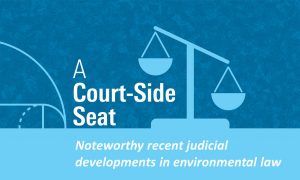Environmental Justice, as an urgent priority of the Federal Government, dates back to 1994, and President Clinton’s issuance of Executive Order 12898. This order directed federal agencies to identify and address, as appropriate, the disproportionately high and adverse human health and environment effects of its many programs, policies and procedures on minority populations and low-income populations. The primary legal basis for this order was Title VI of the Civil Rights Act of 1964, in particular, Sections 601 and 602, which prohibit discrimination in programs and activities receiving federal financial aid and assistance. Over the years, the Supreme Court has reviewed the scope and importance of Title VI. In Alexander v. Sandoval, decided in 2001, the Court concluded that while private parties could sue to enforce Section 601 or its implementing regulations, as written, Section 601 only prohibits intentional discrimination. Noting that disproportionate impact is not the sole touchstone of invidious racial discrimination. Moreover, the Court also ruled in Sandoval that private parties cannot sue to enforce regulations implementing Section 602. Perhaps as an acknowledgement of these shortcomings, the Environmental Protection Agency (EPA) has established an administrative system to process environmental justice complaints at 40 CFR Part 7. Without strengthening the statutory base of environmental justice, the program may continue to be the subject of countless symposiums and seminars. However, this may change soon.
Continue Reading ›








